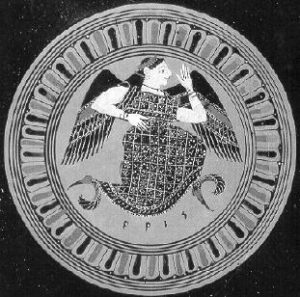
Eris, as depicted on a vase.
Eris is the goddess of Strife in Greek mythology, who appeared in a variety of ancient stories but was best known for her involvement in the Judgement of Paris. Her role is essentially to be the personification of conflict; both internally and with others. The name ‘Eris’ is the equivalent of the Latin name ‘Discordia,’ which can be literally translated to discord.
There is some slight confusion over the reach of Eris; Hesiod in his Works and Days names two similar deities named Eris, one showing internal struggle that can be resolved while the other creates irreparable damage between others. Homer also references two deities in association with Eris as he equates her with Enyo, the goddess of war and the sister of Ares and uses the two names interchangeably throughout the Iliad. Hesiod writes, “As for one, a man would praise her when he came to understand her; but the other is blameworthy: and they are wholly different in nature.” The ancient Greeks used mythology to not only explain natural occurrences such as storms and volcanic eruptions and physical actions such as sickness and injury, but also to rationalise their inner emotions. The existence of Eris is a fantastic example of this as Hesiod has split the deity into the two kinds of strife that a person may feel; an inner conflict that is easily resolved and the other that can escalate and cause external conflict with another. It is this second type of discord that is described as “foster[ing]s evil war and battle, being cruel” and is the type that is responsible for the Judgement of Paris.
We know of the Judgement of Paris from a variety of ancient texts as there is not one solid account that details the entire event. The myth goes that all of the Olympian deities had been invited to the marriage ceremony of Peleus and Thetis, the sea-nymph and Nereid; a union that saw the birth of the hero Achilles. Hera, Athena and Aphrodite were all in attendance, however Eris was notably missing due to her tendency to cause tension between guests. She attended the party anyway in order to toss the ‘Apple of Discord’ into the crowd, a golden apple that had been inscribed with a phrase. This phrase was said to be a variation of “for the most beautiful” or “to the most fairest” and caused the three goddesses to quarrel over who should accept the gift. It was decided by Zeus that Paris, the Prince of Troy should choose the recipient of the apple and so the female deities set about attempting to sway his decision in their favour. All three goddesses first stripped naked in an attempt to seduce him with their beauty, before offering a variety of other gifts. Hera offered Paris political power, Athena offered infinite wisdom that would rival the gods, while Aphrodite offered the most beautiful woman in the world. This woman was Helen of Sparta, the wife of King Menelaus of Laconia. While Greek culture placed a great emphasis on both knowledge and political power, Paris made the decision to give the apple to Aphrodite; an action that appeared cowardly to the Greeks and doomed Troy to an attack by Menelaus.
Homer writes of this briefly in a few sentences in Book 24 of the Iliad in a way that assumed that the listeners would have already been familiar with the details of this story. Ovid goes into more detail in Book 16 of The Heroides writing, “I hope Venus, Love’s mother, hasn’t promised you to me in vain, she who’s urged me to take this course.” Eris lives up to her name in this Judgement, as her actions that were a result of being snubbed for an invite to a wedding ceremony caused a great battle between Troy and Greece that resulted in the sack and fall of the city of Troy.
Homer connects Eris to the war-goddess Enyo by stating “and Terror, and Rout, and Discord that rageth incessantly, sister and comrade of man-slaying Ares”. Enyo was known in Greek mythology as the female deity of war, as well as the sister and battle companion of Ares. By Homer associating Eris with Enyo, he is showing that the evil version of Strife mentioned by Hesiod relates to her connotation with the battlefield. As Eris is essentially the personification of a mental feeling, it is possible for her to be both Eris and Enyo simultaneously.
I find Eris very interesting as she ties in emotion and thought with mythology in order to create a character who can be her own deity or have a strong association with another. If you would like to read more on Eris or the Judgement of Paris, both Homer’s Iliad (trans. Murray) and Hesiod’s Works and Days (trans. Evelyn-White) are good places to start.
-Devon Allen
Junior Girl
Girl Museum Inc.
